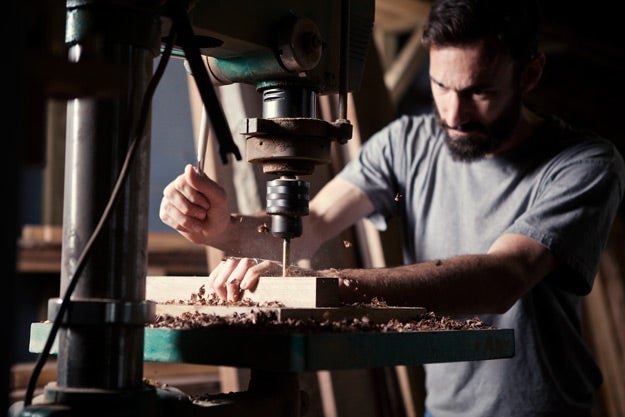Lining the walls and spread out all over the floor of the slightly rusting, 40-foot-long shipping container are various sizes and shapes of cherry, oak, cedar, poplar and pine. The container is so full of wood, there’s barely enough room to walk inside and look around, almost impossible to take it all in. One thing stands out, though: the unmistakable sense – and scent – of nostalgia.
This is the very thing Michael Moran ’03 creates every day: functional works of art that mean something.
Since 2004, he has been making and selling his work to anyone with an appreciation for the beauty and sentimental value of a good piece of furniture. His pieces range from simple end tables to complex armoires and custom bookshelves. They reside in homes and businesses from Michigan to Tennessee. And when he tells you about some of his favorite pieces, he sounds less like a skilled craftsman and more like a proud parent.
“All my clients tell me I can stop by any time to see them,” he says with a smile that lets you know he’s referring to the furniture, not the clients. “But it’s not like I randomly drop in and start petting their coffee table or anything.”
Moran is a tall, slender man with dark, thick hair and a full beard. He has exactly the kind of hands you’d expect to see on a woodworker or a sculptor. His long, slightly calloused fingers reach for the medical mask he wears around his face to keep from inhaling the sawdust as he works. He gently pulls it down to explain how he got into furniture making in the first place.
“My parents always taught me, if you need something, make it.”
Moran grew up in Kentucky, the son of a carpenter-turned-psychiatrist. At the age of 10, when all his friends were begging their parents to buy them skateboards, Moran simply made one himself.
It was this sort of practical approach to life – not to mention his carpentry skills – that led Moran to apprentice with a furniture maker while he was at the College. And it was in that workshop that Moran spent any waking hour that wasn’t spent doing schoolwork or playing soccer. That was where Moran found his calling.
A couple of years after he graduated with a degree in anthropology, Moran finally got the nerve to go out on his own – despite “not knowing the first thing about business.” It didn’t seem to matter: Based on the reputation he’d been building, work orders immediately started coming in – though not all of it was exactly what he’d hoped for.
“I remember a guy calling me one day and saying he needed about 20 chairs and a custom bench,” he says. When Moran pressed him for a little more detail as to what he was after, the man just said he needed them quickly. A little perplexed, Moran quoted him a price and the guy completely balked, saying his gentleman’s club would take its business elsewhere.
Fortunately, it’s been a long time since he’s gotten a call quite like that. These days, he is in high demand, doing so much contract work he can hardly keep up. But, a self-described workaholic, Moran doesn’t seem to mind.
“It’s rare for more than 24 hours to go by and I’m not in the shop,” he says of the space around him, which is littered with rulers, hammers and files. On a table a few feet away sits a giant saw, its blade still slightly warm.
But, even though some of his works can take as long as six months to finish, Moran doesn’t have a particularly tough time parting ways with them when they’re complete.
“It’s the creation that gives me the most pleasure,” he says.
His creations possess a look of their own: rustic with unfinished edges – simple, yet beautiful. They’re quite distinctive looking – or at least they were before the masses started to fall in love with and emulate his style.
“Once you start to see something that looks like yours at Pottery Barn, you know it’s time to change,” says Moran.
So his style is constantly evolving, his work subtly changing in a way that reflects his dynamic personality. But, through it all, one thing remains the same: his passion to create that little slice of nostalgia.
– Bryce Donovan ’98







